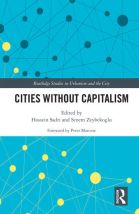Cities without Capitalism

Cities without Capitalism covers varied cases, from tent cities to ecovillages. These chapters recognize the combined effects of policy and economics in affecting levels of equality within a city.
There isn’t necessarily a practical discussion of how to achieve a post-capitalist city, although some authors seek to collapse certain distinctions between rural and urban. According to one, for instance,
“The post-capitalist city will reduce and eventually eliminate the antagonism between human settlements and nature…The post-capitalist city will be a slow city. The transportation infrastructure and the entire city ought to be designed to facilitate the many human interactions that make sidewalks much more than thruways and turn them into public places where a wide array of human interactions spontaneously occurs. Workers will be free from speeded up production and consumption. Everyone will be able to enjoy a lengthy dinner every day with friends and family. Slowing down will abolish capital’s historic drive for the 24/7 lifestyle and perpetual consumption.”
From this perspective, a post-capitalist city would be a greener and fairer city, with fewer polluting private vehicles, more communal forms of governance, and more protection of the rights to housing and public services. It’s an appealing vision, but one that requires further details and commitments to truly understand what a post-capitalist city would look like in practice.
Further reading:
Chatterton, Paul (2016), “Building transitions to post-capitalist urban commons”, Transactions of the Institute of British Geographers Vol 41, No 4, pages 403–415, available at https://eprints.whiterose.ac.uk/100783.
Ríos, Diego (2015), “Present-day capitalist urbanization and unequal disaster risk production: the case of Tigre, Buenos Aires”, Environment and Urbanization Vol 27, No 2, pages 679–692, available at https://journals.sagepub.com/doi/full/10.1177/0956247815583616.
Search the Book notes database
Our Book notes database contains details and summaries of all the publications included in Book notes since 1993 - with details on how to obtain/download.
Use the search form above, or visit the Book notes landing page for more options and latest content.
For a searchable database for papers in Environment and Urbanization, go to http://eau.sagepub.com/

